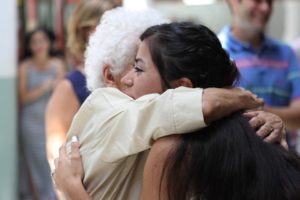 When social isolation was introduced and residents in our care homes couldn’t have visits from their families and friends our carers were swift to bring in laptops and tablets and arrange ‘Face-times’. A few found it confusing but most residents loved it. One mum said she preferred it to the window visits and another was given her own tablet by her daughter so she could call her at any time.
When social isolation was introduced and residents in our care homes couldn’t have visits from their families and friends our carers were swift to bring in laptops and tablets and arrange ‘Face-times’. A few found it confusing but most residents loved it. One mum said she preferred it to the window visits and another was given her own tablet by her daughter so she could call her at any time.
So I was surprised to read that Lancaster University had found that ‘an older person who had only virtual contact during lockdown experienced a greater loneliness and negative mental health impacts than an older person who had no contact with other people at all.’[i]
wondered if it was because the virtual contact was the equivalent of eating one square of a bar of chocolate, leaving you missing the whole bar desperately and feeling deprived when you couldn’t eat it.
The difference was that in care homes residents had the benefit of their carers’ attention and affection. They went out of their way to prevent them feeling lonely. Emma, one of our care home managers told me about the housekeeper who would sing with residents as she vacuumed their rooms during lockdown.
Another problem, according to Dr Hu, was that the extensive use of the technology over lockdown was so stressful to older people that it was more damaging to their mental health than simply coping with isolation and loneliness. He added that, ‘extensive exposure to digital means of communication can also cause burnout. The results are very consistent.’ The study involved data from over 5000 people aged 60 or over in the UK and nearly 1400 in the US, both before and during the pandemic. Loneliness is dangerous to the health of older people, releasing enzymes and biochemicals that cause physical conditions, including dementia where risk is doubled.
Anyone using Internet technology will have stories of stress. I feel it’s like working with a jelly. It often wobbles, distorts your work and sometimes disappears altogether.
Many older people are quite comfortable using the Internet, and the numbers are growing. But something that was missed most of all during lockdown was being able to touch other human beings. It’s one of our most vital senses. Retired care home manager Janet Jacob used to tell me how residents with dementia would reach out to touch her, sometimes stroking her arm or her back. A plaintive theme through the pandemic was the cry of the elderly asking when they could hug their grandchildren again.
[i] the Guardian, 26-07-2021














